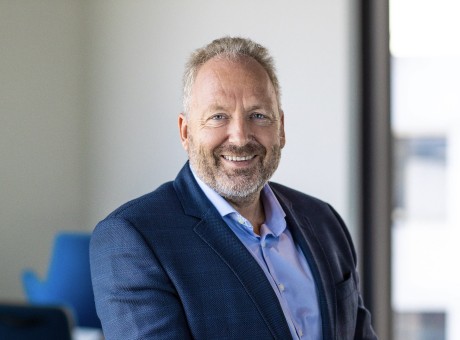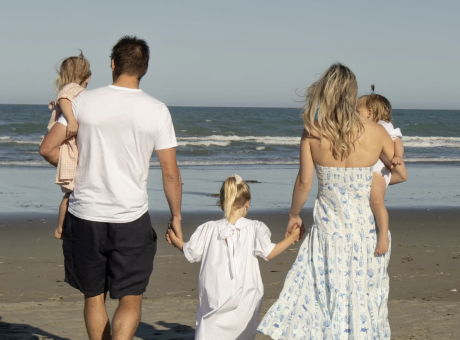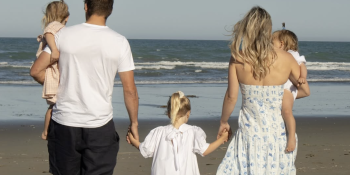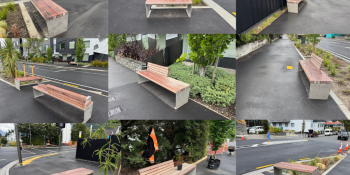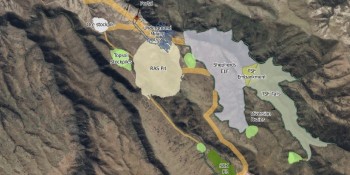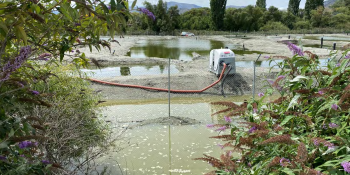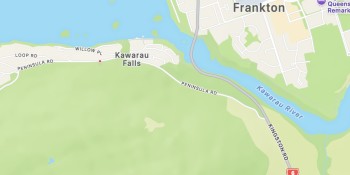Seven fight it out in crowded Cromwell by-election
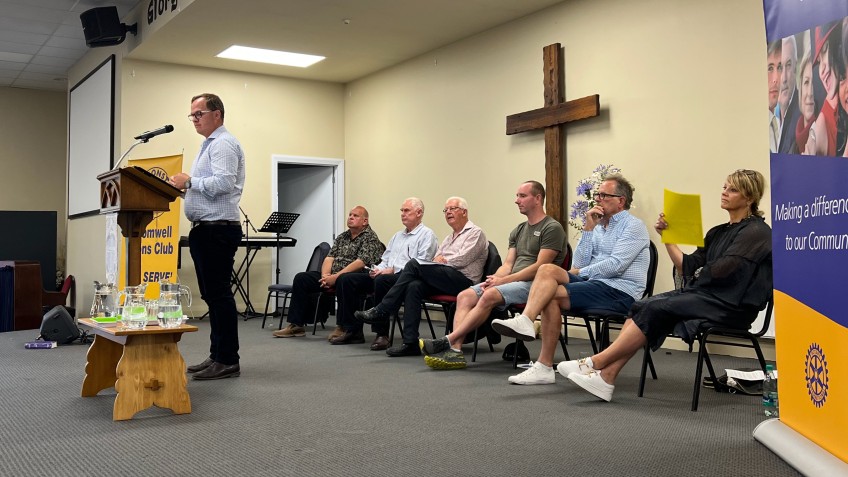
From not having enough candidates three months ago there’s now a highly competitive by-election race for one seat on the Cromwell Community Board.
One resident who turned up at the town’s Presbyterian Church last night to hear from those who’ve thrown their hat in the ring for the role summed it up on arrival: “They couldn’t get one, and now there’s seven.”
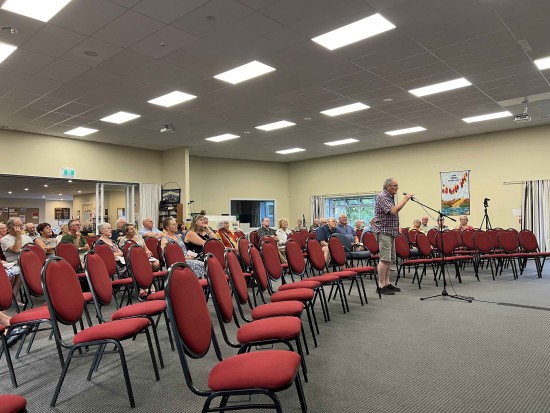
The Monday night crowd was 50 strong, predominantly grey-haired and left the front two rows of the auditorium empty - but they threw up some curly questions for Cromwell's by-election candidates.
In October, during the local government elections, not enough candidates came forward to fill the four available seats on the local board.
Now, three months later, residents and ratepayers in the Cromwell Ward of the Central Otago District are back to the polls.
But, this time, there’s no shortage of candidates.
Mayor Tim Cadogan, whose top spot also wasn’t contested in October’s elections, opened last night’s meet-the-candidates debate.
“I really didn’t know what to expect for a by-election,” he said, referring to the size of the crowd.
It was approximately 50 strong, predominantly grey-haired, and left the front two rows of the church auditorium empty.
But, after listening to a five minute elevator pitch from each of the six candidates in attendance – Sian Simpson was a no-show, although she sent a written statement to be read in her absence – they weren’t shy to throw up some curly questions.
The carving up of the town’s golf course for future residential development, selling off public greenways to help big business grow, and whether the much-invested-in masterplan was already outdated were all hot topics.
How much influence one voice around the community board table can have on these issues is questionable in itself, but it didn’t stop voters from asking the questions.
A community board with clout
Mayor Cadogan told the crowd being elected to local government can be a tough gig.
“Thank you for putting your hands up,” he told the candidates. “It’s a really hard thing to do; it’s a very brave thing to do; and in a democracy it’s an incredibly important thing that people do it.”
There’s often confusion in the community about what the local board can actually do, and there can be tensions between what it wants to do locally and what is actually in its powers to do and in line with council policies, the mayor says.
But, the Cromwell Community Board is unique – community boards around the country by law can’t acquire, hold or dispose of land, or have a bank account, but Cromwell’s has quite the nest egg.
“It’s held by council in a bucket labelled ‘Cromwell’, to put it very simply,” the mayor says.
It’s the result of forward-thinking decision makers from day’s past, who invested in land for the benefit of future generations.
Who better to decide how it’s spent today than the local community board, the mayor says.
“I can tell you after six years of being mayor, I’ve not met another mayor who has community boards as powerfully delegated as we do here, in Central Otago.
“A lot of community boards around the country sort of get to decide what colour the posts might be painted at the rugby grounds – that might be a bit hard, but they really don’t have anything like what we’ve got.”
His warning for voters: if you don’t use them, you may lose them.
Local government is up for review and if central government sees a continued lack of engagement with local decision making, it may just end up taken off us, he says.
What he was requesting: that people get out and vote.
The candidates (as they spoke)
David Horton 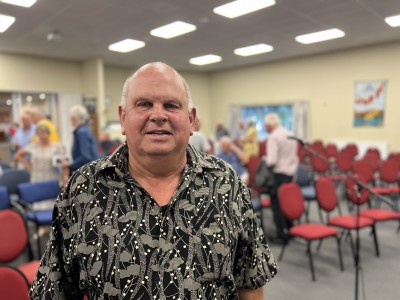
He may have been in town for 20-odd years but reeling off his credentials he started with his Invercargill “farming background” and the “blue collar” beginning to his working life as an apprentice turner.
But most people will link Mr Horton’s name to a series of early and successful property developments in Cromwell – Gair Estate and The Rise, among them.
“I did those sections and I never got a negative call from the council or community board.
“The reason why I wanted to put my hand up for the community board is because I think I’ve got stuff to offer.
“I’ve got a bit of a background in the development game, I don't think I'm too much of a prick in the room, so there’s certainly positive things that I’d like to bring to the table."
Managing people's expectations in response to a question from the audience on super-charged development: "I'm going to put my developer hat on...600 to 700 square metre sections...those days have gone. As much as we don't like it, gone are the days of the big sections...the developer, they want as much money as they can."
Wally Sanford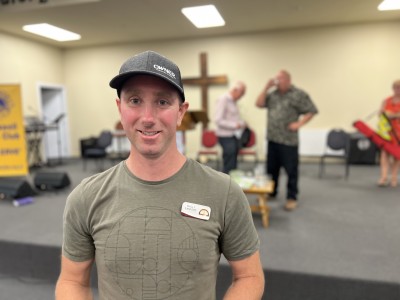
The only candidate to address the elephant in the room: “I think, after talking to the other candidates, it’s pretty unanimous that we all kind of regret not going three months ago. So, sorry about that, but we’re here now.”
He’s a licensed surveyor, a dad of two, and the head of a local residents group, when it’s in session.
“I’ve been running the Pisa district community group for the last few years, until basically nobody turned up to the AGM.”
He may have led with a self-deprecating humour, but he showed he was clued up on local matters and had a respect for some of the complexities of local decision making.
“There’s never a simple yes or no”, he replied to an audience question on his take on a previous board decision.
“I’ve been involved in a lot of planning processes around Cromwell in the last eight years.
“I was in this room defending our town against Plan Change 13. I participated in the Wooing Tree original plan change – in support of it. I have been involved with Prospectors Park from design concepts through to contract management."
He’s been posting regularly since announcing his running on a campaign Facebook page.
“Some of you, hopefully, are aware of my campaign to date. I’ve got a lot of material out there – my thoughts on various subjects around town.”
Top of his concerns: housing affordability, he says.
“I’ve got lots of aspirations where Cromwell could get to…but we’ve got to be realistic about how the community board can deliver them, or one out of seven votes on the community board can deliver them.”
In response to a question from the floor on whether the Cromwell Masterplan was already being superseded by rapid and private residential development, he called the heavily-invested-in by council masterplan “just a glorified conversation at the end of the day…I just hope the processes moving forward get as much pomp and ceremony…where the rubber hits the road is with Plan Change 19”.
David George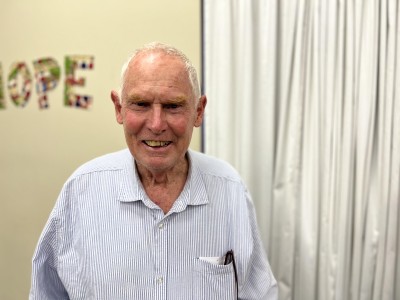
The only candidate to have had his name on October's ballot papers, David George unsuccessfully stood for a seat representing the Cromwell Ward on the Central Otago District Council. He's also not new to a community board by-election - he lost to current board member Bob Scott in a vote to replace Robin Dicey, who unexpectedly vacated his seat in 2021.
Now, he's back for another try, with a strong cause: "I'm standing on a single issue, because I think it's really important...the location of the museum".
Mr George has been vocal in expressing his disappointment with concept plans for the new Cromwell events centre, set to replace the problem-plagued memorial hall.
Specifically, a planned shift of the war memorial itself, to make way for a museum that will form part of the events centre.
"I think the museum as proposed is going in the wrong place.
"The open space around the hall is really important for us - that outlook looking south towards the Carrick Range and looking over Lake Dunstan...Hopefully, when Anzac Day resumes again (referring to Covid disruptions), we can still use our parade ground."
He expressed his frustration at being not accepted to join the Cromwell museum's board of trustees, and in response to tension after current museum board boss Martin Anderson took to the public mic at last night's meeting the adjudicator suggested both men "agree to disagree".
Introducing himself, he said: "I think I know about two-thirds of you - I was born and brought up here. I trained as a community worker, setting up facilities here in Cromwell. And I still step in and do stuff like that."
Mr George e-biked to the public meeting.
Huw Murray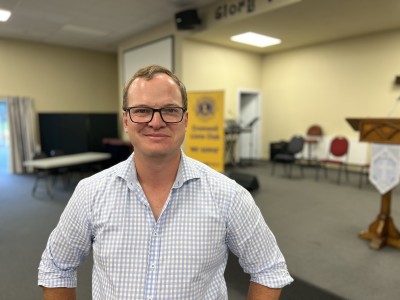
An agronomist, with three young children, he told the audience he was "excited to share my vision for our community".
His first issue off the rank, and not mentioned by any other candidate: community engagement: "I believe that it's important for our community board to be accessible and responsive to the needs and concerns of all residents, by whatever means we can...We can always do more on social media sites, so residents can share ideas and thoughts with the community board and where the community board can provide updates on what it's doing to address these concerns."
Other concerns: affordable housing, flagging a desire to revisit and "revamp" the secure homes model, shelved by district councillors; the development of a "strong economic development plan that will benefit our entire community"; and "improving infrastructure and public spaces".
"I believe by working together we can create a better and brighter future for Cromwell.
"It's an amazing place to live, work and raise a family, with a strong sense of community and a rich history. I believe that we can do better - this is why I'm running for the community board."
Commenting on the out-of-date masterplan, increasing residential development and Plan Change 19, in response to an audience question: "There's going to have to be some solid thought put into that to make sure we don't swamp ourselves."
Putting themselves forward for election, each candidate needed two people within the ward to nominate them - one of Mr Murray's people is Anna Harrison, the sitting chair of the Cromwell Community Board.
Tony Haycock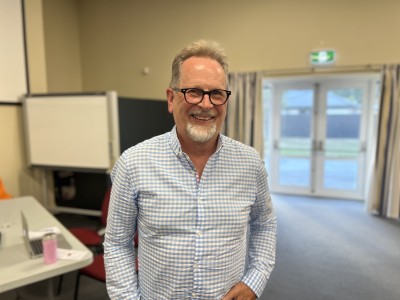
Two apologies at the start: firstly, for not being a strong public speaker (although his subsequent speech didn't entirely back this up - and, if anything let him down it was the faulty microphone rather than his spiel itself); secondly, for being a shorter-term local.
"I moved to Central two years ago, so I guess I'm a newbie in town, really, certainly compared to some of my fellow candidates here. But, maybe a fresh face, with fresh ideas is what you want."
He's an import from the Waikato, where he's worked in the health sector: 15 years as a GP and 25 or so "in the commercial development space" - simply, deciding where new healthcare facilities may go, helping to design them, and dealing with stakeholders to get them across the line.
There's governance experience too from up north. Some of it uninspiring - he references feeling frustrated that he "had a lot of experience with a rubber stamp" during a stint on a health board - some, more fulfilling, including two terms on a secondary school board and two terms with a Hamilton trust providing community services for drug and alcohol support.
Perhaps not surprising due to his skill set, he made a strong case for a healthcare hub to be located in Cromwell, echoing a suggestion by Mayor Cadogan last week that an "inland Otago hospital" may have a place in the town.
One of his declared super-strengths: "Herding cats" - an informal way of talking about "stakeholder management". In response to a question from the floor on the future of the golf course, Mr Haycock said he reckons it's vital people making governance decisions are able to understand and balance the needs of different stakeholder groups.
Plus, he says he's a guy with "time and enthusiasm for the role", he says.
Annabel Blaikie
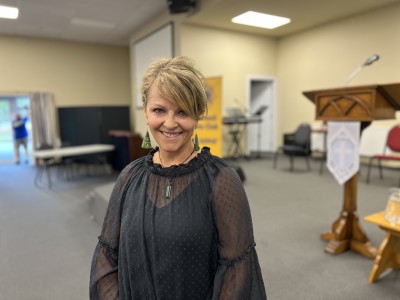
The only candidate to begin her elevator pitch with her pepeha (or use any te reo Māori at all during her allocated time at the lectern).
Also the only candidate who in her supplied bio for voters stated their primary residence as not being in the Cromwell Board area.
Ms Blaikie says she moves between Blenheim and Cromwell, where she runs a recruitment business.
“Covid changed everything for business…it challenged us to innovate, and find new ways of doing things. It pushed us to be productive in a way we never had before and to find new ways to connect with each other.
“In short, remote and flexible working is here to stay.”
She’s not new to local government politics, having served on the Cromwell Community Board for a three-year stint after the 2016 elections.
“Whilst I was a member of the Cromwell Community Board… I learnt that patience is a virtue. No matter how enthusiastic you are about a platform, idea or discussion, red tape will always be prevalent every step of the way.
“I learnt that holding one view at the beginning of the meeting, may actually not be your view when votes are about to be cast.
“I learnt to politely disagree while listening to other people's points of view. But that does not mean that you can't go out and have a bit of a laugh and a wee drink afterwards.”
Her finish: “It is time to now act differently, respond differently, think differently. I welcome your feedback and I welcome your vote.”
Sian Simpson
Wasn’t at the speaking event, but her candidate profile, along with all the others, is able to be viewed here.
Voting while you shop
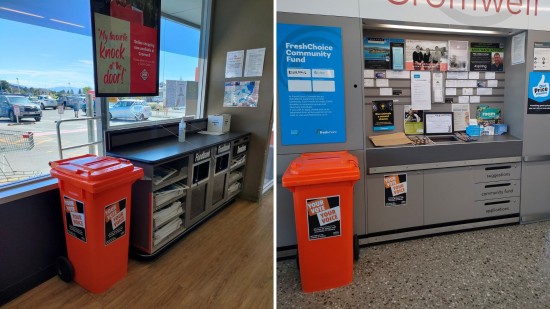
It's a local elections first for Central - voting in supermarkets is available for the Cromwell Community by-election (Images: CODC).
In a first for the district, Cromwell voters in the by-election can return voting papers to drop-off boxes in local supermarkets.
Look for an orange wheelie bin near the checkouts at the town’s New World and Fresh Choice supermarkets – they’re waiting to take completed voting papers.
The district’s deputy electoral officer Deborah Beange says supermarkets are a community hub and a natural choice to place the makeshift ballot boxes to make voting easy and accessible for everyone.
“While there is hand-wringing nationwide about the low engagement in the 2022 local elections, Central Otago District Council is making changes to do something about it.
“People’s lives are busy, and our voting process needs to adapt.”
As at other elections, voting papers can also be hand delivered to the Cromwell Library, or the council’s offices in Cromwell or Alexandra.
Allowing voting papers to be collected outside of council-run buildings has been allowed in other urban centres during local elections, and the council was keen to pilot the idea during this by-election.
“If successful, this is something that Council would like to expand to more supermarkets in the district in the next local election.”
As at other elections, voting papers can also be hand delivered to the Cromwell Library, or the council’s offices in Cromwell or Alexandra.
The last day to post voting papers via snail mail is Valentine’s Day - Tuesday, February 14. After that, they’ll need to be dropped into the orange ballot bins, where you have until noon on Friday, February 17.






